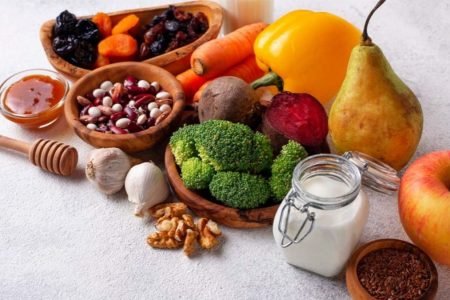3 Best foods to eat for gut health
- Yogurt
Yoghurt is the most popular probiotic food, and for good reason. When healthy bacteria are added to milk, they metabolise lactose to produce lactic acid and other helpful microorganisms. Look for yoghurt that bears the “Live & Active Cultures” seal, which guarantees 100 million probiotic cultures per gramme at the time of manufacturing.
A brief glance at the ingredients list will also reveal whether or not the yoghurt contains bacteria. Don’t consume dairy? Yogurt’s probiotics aid in the digestion of lactose (milk sugar), thus if you’re lactose intolerant, you may be able to consume yoghurt (and kefir). Furthermore, numerous firms now manufacture dairy-free and vegan yoghurts with probiotics.
- Kombucha
Kombucha is a sour, fizzy tea created by infusing green or black tea with a SCOBY (symbiotic colony of bacteria and yeast) and sugar. The mixture is then fermented for a week or more. During fermentation, alcohol and gases are created, providing natural carbonation to the kombucha. The level of alcohol is often less than 0.5% ABV—and commercially manufactured kombucha is required to maintain it no higher than this amount (federal law specifies that any product with more than 0.5% ABV must be regulated and sold as an alcoholic beverage). Some DIY kombuchas, on the other hand, have been reported to have ABVs of 2%-3%.
- Onions
Onions include inulin, fructans, and fructooligosaccharides (FOS). FOS are not only prebiotics that help build up gut flora, but they also help to improve a variety of conditions, including diarrhoea, osteoporosis, atherosclerosis, gastrointestinal disorders, cardiovascular disease, and type 2 diabetes, according to a 2022 review of the literature published in the International Journal of Molecular Sciences.
Onions are extremely versatile: they can be added to soup or salad, grilled and served on top of a turkey burger, or roasted with herbs and served as a side dish.
- Asparagus
Because of its high fructan content (inulin and FOS), asparagus is a potent prebiotic for the gut. According to a 2020 study published in the journal Metabolites, it is also high in antioxidants, which are natural substances that protect the body from free radicals and other inflammatory components.
To make roasted asparagus, simply toss the spears with olive oil, salt, and pepper and roast at 400°F for 10 to 15 minutes. Alternatively, shave raw asparagus over a green salad. Asparagus is very tasty when mixed into pasta or an omelette.
- Garlic
Garlic has anti-inflammatory properties and may help lessen the risk of heart disease. Garlic’s major fibres are inulin and fructooligosaccharides, a powerful prebiotic pair. But garlic isn’t just for cooking.
Garlic has also demonstrated significant health effects in cancer, cardiovascular disease, metabolic disorders, blood pressure, and diabetes, according to a 2020 review published in the journal Antioxidants, due to its antioxidant, anti-inflammatory, and lipid-lowering capabilities. Those little cloves provide a lot of health benefits.
